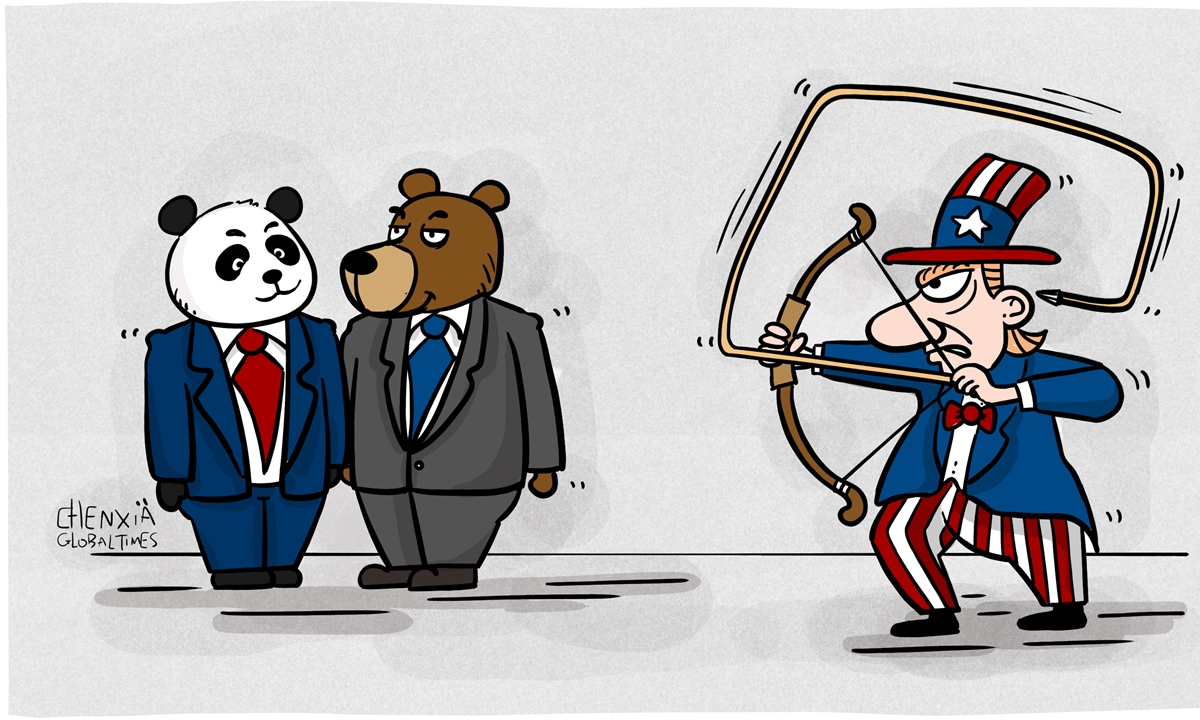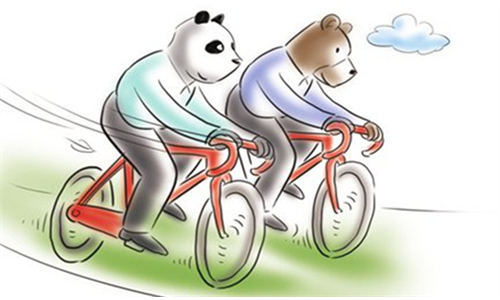
Illustration: Chen Xia/GT
An article published by Foreign Policy on Tuesday, entitled "China and Russia Turn Deeper Ties into a Military Challenge for Biden," quoted an former US politician as saying the US faces "a two-front war where we don't have a two-front military." This seems to be an emerging possible scenario that is puzzling some American analysts.
On April 14, Reuters published a similar commentary headlined "US faces test on Taiwan, Ukraine," which articulated the concern.
Yet the test is caused by the US itself, thanks to its recklessness in handling major global issues. It is Washington itself which has been stirring up troubles worldwide, rather than resolving crises. Now the tactic is backfiring - Western media are becoming concerned that "rising tension over both Ukraine and Taiwan is putting the Biden administration in a bind," or worse, lead to "a two-front war."
The Taiwan question is China's domestic affair, where the US is not supposed to interfere at all. The Ukraine crisis involves the issue that should be decided by the Ukrainian people. But the US won't cease creating tensions over it.
US political elites have shown little interest in self reflection. More importantly, they attach too much significance to major power geopolitical games. In their eyes, if the US makes concessions over the Ukraine issue, it could result in Russia returning to Europe. In that case, everything Washington has been struggling for over the past 30 years since the end of the Cold War will crumble to dust.
When it comes to Taiwan, the US regards the island, from the military perspective, as a crucial link in its first island chain to contain China. Diplomatically, the US is utilizing the island as leverage to boost secessionist forces in China, in an attempt to split the latter, or launch a "peaceful revolution."
Suppressing Russia and China has been a long tradition in US politics. Apart from former US president Donald Trump, who once attempted to cozy up to Russia, yet failed due to opposition from the Democratic Party, most US presidents tend to pile pressure on both countries. Yet the problem is that the US has found it increasingly difficult to do so.
The US' biggest challenge is at home, not so-called threats from China or Russia. If the US hastily engages in, or creates more external geopolitical tests, while not having resolved its own domestic problems, it will only have its nose rubbed in the dust both at home and abroad, not to mention winning the "battle" on either side.
The US has its own calculations. It is hoping to push the EU to the forefront of the Ukraine crisis, letting the EU invest in more resources while the US could just play a commanding role. In addition, although the US reiterated its support for Ukraine, the latter's top diplomat has been stressing that Ukraine "is looking for more than words," Politico reported on April 13. It means the US' capability is very limited. It is just like the way Washington is dealing with Beijing - trying to establish an anti-China camp with as many allies as possible. If the US believes it can handle the Taiwan question and Ukraine crisis as it wishes, or in other words, China and Russia, at the same time, it has overestimated its strength and wisdom.
The truth is, the US is not confronting two tests, but three. The biggest crisis is from its home affairs. The biggest battlefield for US policymakers is on US soil. The best solution for elites in Washington is to put more energy in focusing on their country's domestic puzzles and stop creating troubles abroad.
The author is professor at the Institute of International Relations of the China Foreign Affairs University. opinion@globaltimes.com.cn

